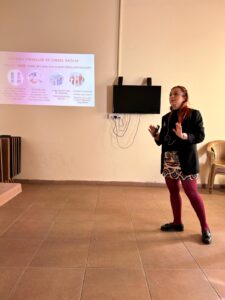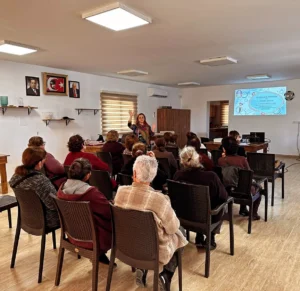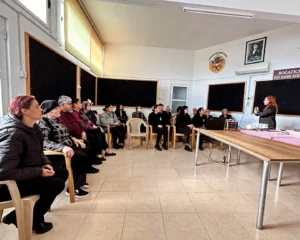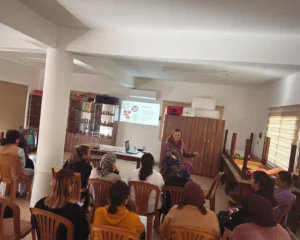In cooperation with Iskele Municipality, Near East University’s Gender Research and Application Center (TOCAM) and the Dean of Students Sexual Health Service Unit, Public Education was organized in 21 villages in the Iskele Region and in Iskele Center for a month.
Near East University Obstetrics and Women’s Health Nursing Lecturer Assoc. Dr. Dilek SARPKAYA GÜDER met with citizens on the subject of ‘Sexuality and Sexual Health for Everyone’, the first of the Public Educations in the villages and centers of the Municipality.
Between January 4 and January 26, 2024, information and awareness was created about the importance of lifelong sexuality and sexual health in the training given in 9 village locals/women’s courses and centers representing 21 villages.
In her training, Sarpkaya Güder talked about the importance of sexuality and sexual health, sexual rights, common sexual problems and sexual health problems, the meaning of sexuality and sexual health problems in every life period.
Finally, safe sex and sexual practices such as monogamous sexual life, use of internal and external condoms in all kinds of sexual intercourse, use of highly effective contraceptive methods to avoid unwanted pregnancy, early diagnosis and treatment of sexually transmitted infections, avoiding smoking and alcohol consumption. Also she made suggestions for health.
It has been emphasized that seeing sexuality as a taboo, family attitudes and social pressures negatively affect experiencing and talking about sexuality. The concept of sexuality, which includes not only the sexual organs but also the body and mind and covers the whole life, includes sexual health, which is a state of well-being related to sexuality. The necessity of a positive and respectful approach to sexuality in which the sexual rights of all individuals are protected is emphasized. Since sexual health is an indicator of a person’s general physical and mental health, attention has been drawn to the importance of sexual dysfunctions and sexually transmitted infections, which are common in the world and in our country.
Emphasizing that the privacy education given by families at home in our country and the lack of sexual education/sexual health education that should be given in schools are an important reason for sexual problems and sexually transmitted infections, Sarpkaya Güder emphasized the important points that should be taken into consideration in terms of sexual development from the womb to infancy and childhood and made suggestions.
Since the majority of the participants were older, it was emphasized that sexuality continued in this age period and that there was a change in the expression of sexuality, increasing passion and closeness in relationships. According to scientific studies, it is emphasized that since there are many false beliefs and thoughts about sexuality in old age, reducing them and sexual socialization positively affects the quality of life and physical health of our elderly.



